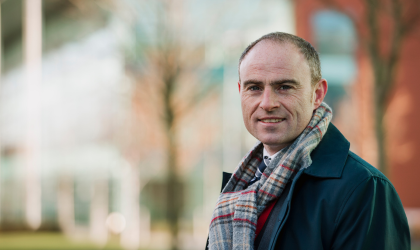Treatment pathways for alcohol dependency
Starting your recovery journey can feel daunting, but you don’t have to do it alone.
At i-access, we’re here to support you every step of the way. Our alcohol dependency pathway is designed to provide the help you need, at a pace that feels right for you.
The first step is reaching out. You can:
- Call us: 0300 222 5932 (Monday to Friday, 9am - 5pm).
- Refer yourself online: Complete a short referral form.
Once you’ve contacted us, we’ll be in touch within 7 days to guide you through the next steps.
Your first appointment will be a chance to talk about your situation. We can offer this by telephone or face to face and you are welcome to bring someone you trust to your appointments.
This assessment helps us understand:
- how alcohol is affecting your life
- any challenges you’re facing, such as physical health issues or emotional difficulties
- what your goals are, whether that’s cutting down or stopping drinking.
Together, we’ll create a plan tailored to your needs.
If you’re ready to make changes, your key worker will help you to prepare. This might involve:
- understanding how alcohol affects your body and mind
- identifying triggers that lead to drinking and exploring ways to manage them
- supporting you to stabilise your drinking and regain some control. Stabilising your alcohol is the first step in detoxification
- speaking to family and friends about how they can support you through this process.
If you are dependent on alcohol, the aim at this stage is to stabilise your drinking, regain some control, and reduce gradually and safely.
Our Abstinence Preparation Group (APG) is:
- an evidence-based programme designed to support long-term abstinence
- a 6-week group of no more than 8 people
- held both virtually and face-to-face at different locations and times across Surrey
- optional as one-to-one but we encourage people to attend groups where possible as this offers the benefits of meeting others and mutual support.
People who complete the Abstinence Preparation Group are nearly twice as likely to stay alcohol-free in the first month compared to those who don’t (74% vs 43%). After three months, their chances of maintaining abstinence are still higher (49% vs 40%).
Read more about this research here.
If you are not ready to stop drinking completely we have a specific group for you.
Alcohol Education Group (AEG) provides:
- an online group of no more than 8 people
- education and information on the risks of alcohol use
- strategies and advice on how to reduce.
Once you have completed the Abstinence Preparation Group (APG) and if you are still struggling with alcohol dependency, your clinical case will be discussed with our Multi Disciplinary Team. There are various options available:
- book an assessment with our Ambulatory Team
- home detox, if clinically appropriate
- ambulatory (coming in every day for medication and support) detox
- inpatient detox (Bridge House in Kent)
You may find that you're able to reduce without medical intervention but we will ensure you have the appropriate support.
Once you have become abstinent from alcohol, we’ll support you to stay on track. This includes:
- Relapse prevention: Practical advice to help you manage cravings and maintain progress
- Peer support: Connect with others who have lived experience of recovery
- Community activities: Join recovery cafés, refer to employment support programmes and signpost to local groups to continue building a healthier lifestyle.
- Residential rehabilitation: Our partners from Surrey County Council Social Care Team can make referrals to residential rehab subject to treatment milestones being met. Once in treatment and engaging fully it might be that you have a conversation with your allocated keyworker to explore whether this is a suitable option for you as part of your treatment journey.
Building long-term support
Recovery doesn’t stop with a medical detox. We offer ongoing support to help you make lasting changes:
- One-to-one key working: A chance to explore challenges and work towards your recovery goals
- Group sessions: Meet others on similar journeys and share experiences in support groups
- Workshops: Learn new skills to build resilience and prevent relapse.
- Mutual support: signposting towards the 12-step fellowship such as Alcoholics Anonymous (AA) and SMART to establish long-term recovery support once treatment with i-access is complete.
Example journey and support for someone dependent on alcohol
Stage 1Preparation |
Stage 2Detoxification |
Stage 3Relapse prevention |
|---|---|---|
--------------------------------------------------->
|
||
|
|
|
You are not alone
You’ll be supported through every step by your allocated keyworker. However, we take a multidisciplinary approach, meaning you’ll also benefit from the expertise of a variety of professionals. Learn more about who will support you.


